Key takeaways:
- Privilege discussions encourage self-reflection and empathy, challenging individuals to confront systemic advantages and disparities in their lives.
- Understanding the historical context of reparations is crucial, highlighting the need for meaningful conversations about past injustices and their long-lasting impacts.
- Engaging in dialogues about privilege and reparations requires vulnerability, openness, and a commitment to listening to diverse perspectives, fostering deeper connections.
- Advocating for change begins with education and active community participation, emphasizing the importance of speaking up against harmful stereotypes and supporting marginalized voices.
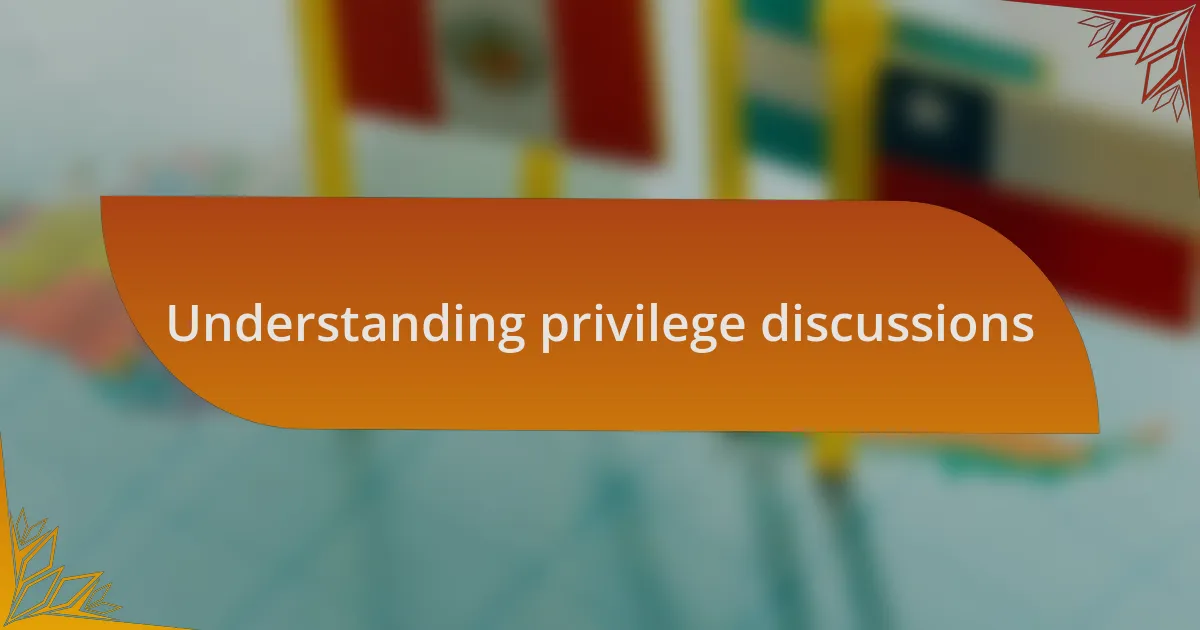
Understanding privilege discussions
Privilege discussions can sometimes feel abstract or distant, but they resonate deeply in our daily lives. I remember a moment during a group discussion at a community event where someone shared how their background shaped their educational opportunities. It struck me that while I had worked hard, others faced hurdles I never had to even consider.
When we talk about privilege, it’s crucial to recognize that it’s not about dismissing hard work or achievements. Instead, it invites us to reflect on the systemic advantages some individuals have over others. Have you ever thought about how your environment and upbringing shaped your worldview? These conversations push us to examine our own lives and encourage empathy for those not afforded the same circumstances.
What often surprises me is how conversations around privilege can lead to discomfort, yet they are essential for growth. I recall a time when I hesitated to engage in these discussions, fearing backlash or misunderstanding. But through the discomfort, I recognized that these dialogues are necessary to foster understanding in our quest for equity and justice. These moments not only challenge our perspectives but also motivate us to think critically about our role in creating a fairer society.
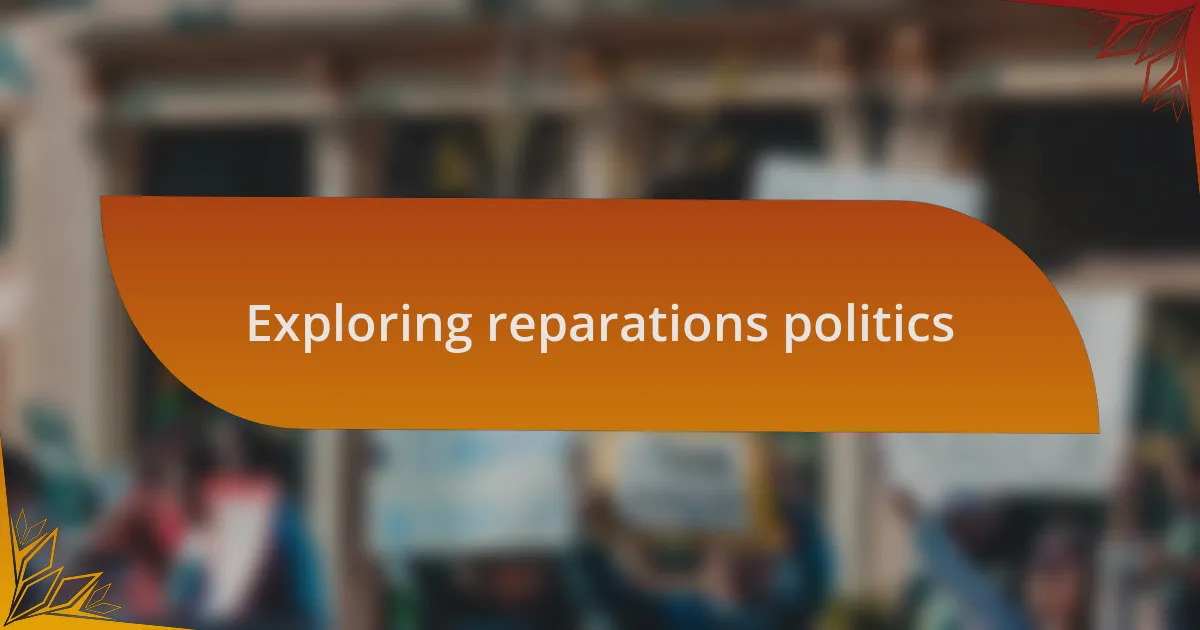
Exploring reparations politics
When exploring reparations politics, it’s important to dive into the emotional weight behind the discussions. I recall a conversation I had with a friend who had recently learned about the reparations debate in America. They were shocked to realize the historical injustices that led to current economic disparities. This moment highlighted for me how many people are unaware of the deep-seated impact of these issues on today’s society. How can we expect progress if these conversations aren’t happening at every level?
The complexities surrounding reparations can sometimes feel overwhelming. I often find myself reflecting on how society views compensation for past wrongs. For instance, in a recent community forum, I listened to an elder share their family’s struggles stemming from historical injustices, painting a vivid picture of the generational trauma involved. This conversation made me realize how vital it is to engage with these stories, as they breathe life into the statistics and policies often discussed in abstract terms.
To truly grasp the nuances of reparations politics, I believe we must challenge our own biases and beliefs. Have you ever sat down to consider what reparations could look like in practice? Reflecting on this issue, I think of the possibility for genuine healing through financial compensation or community investment. Each perspective we hear adds layers to our understanding and enriches the dialogue needed to drive meaningful change.
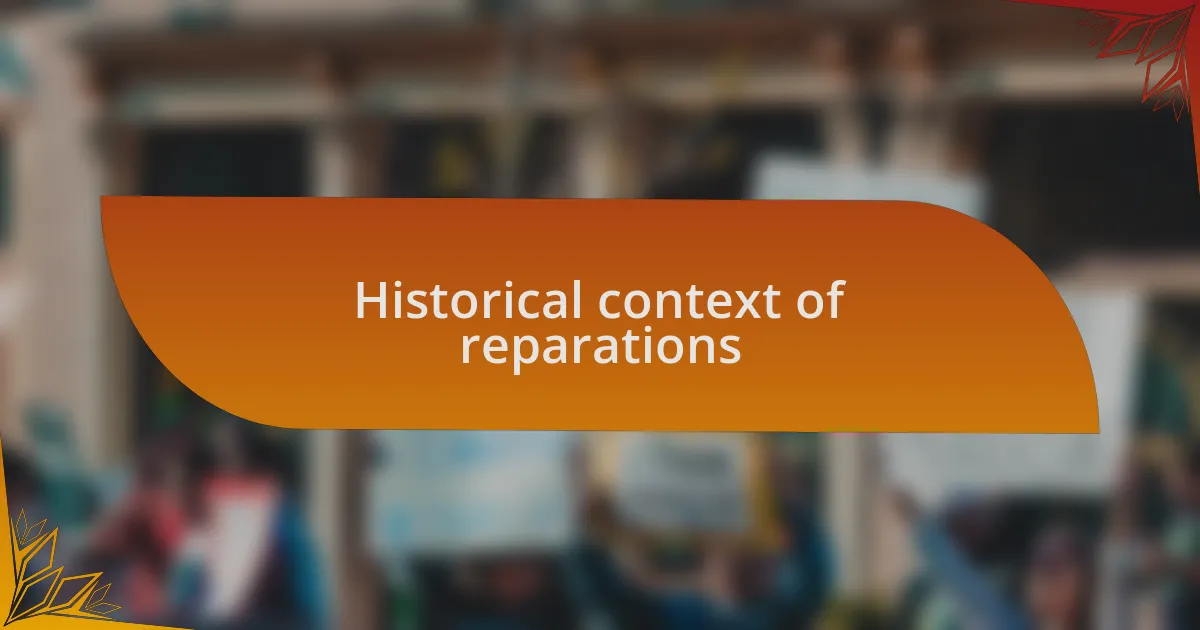
Historical context of reparations
Throughout history, the call for reparations has often emerged in response to collective trauma and systemic injustice. For instance, after the Civil War, there was a brief moment when the government discussed reparations for formerly enslaved individuals, a topic that struck me as both ambitious and deeply necessary. Yet, this initiative was ultimately abandoned, leaving a legacy of unaddressed grievances that still resonate today.
Looking at global contexts, countries like Germany have made notable efforts to reconcile the past through reparations for Holocaust survivors. I find it fascinating how such actions challenge our perceptions of justice and equality. Why is it that some nations actively pursue reparative measures while others shy away from acknowledging their histories? This disparity makes me ponder the role of public sentiment and political will in shaping conversations around reparations.
As I reflect on these historical instances, I’m constantly reminded of the personal stories that emerge from these larger narratives. During a discussion with a local activist, I learned about the lingering effects of redlining in our own community. Hearing how these policies have created cycles of poverty for generations underscores the urgency of reparations. How can we ignore such profound impacts on individuals and families? It’s these connections that compel us to engage seriously with the conversation on reparations.
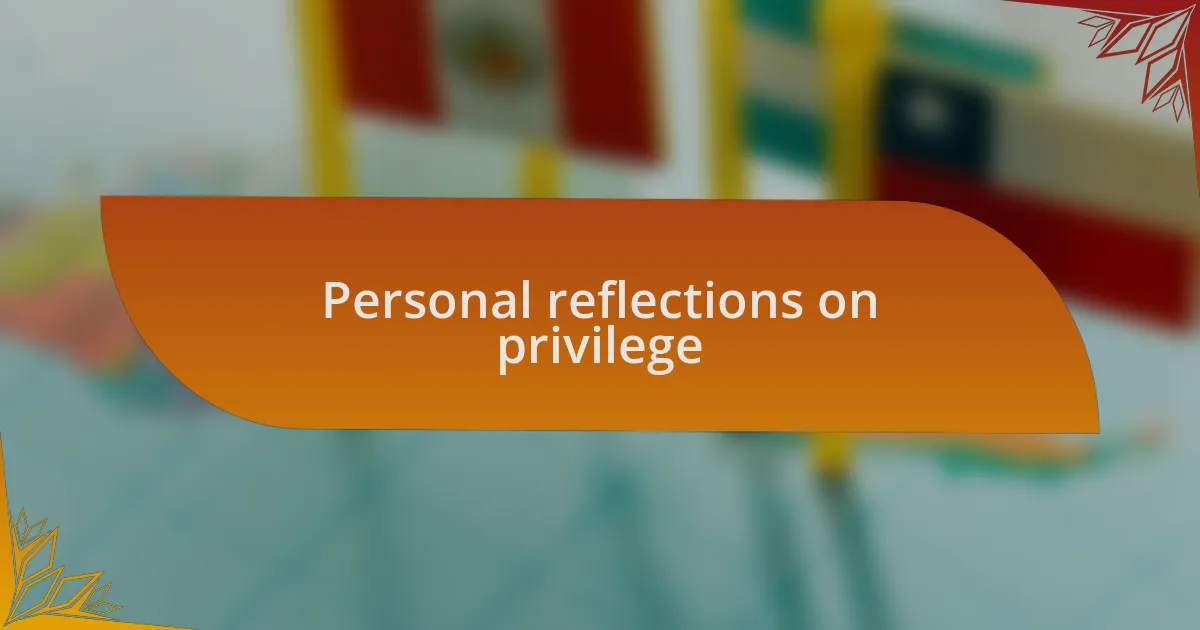
Personal reflections on privilege
Reflecting on the concept of privilege often brings me to my own experiences. I remember a time when a friend shared her struggles navigating systemic barriers, while I found opportunities handed to me on a silver platter. This stark contrast wasn’t merely an eye-opener; it made me question how my own background shaped my path. How could I remain oblivious to the advantages I had? Acknowledging privilege isn’t just about guilt; it’s about understanding the broader context of disparities that affect countless lives.
In discussions of privilege, I’ve noticed a tendency to shy away from uncomfortable truths. I once attended a workshop on social justice where participants hesitated to acknowledge their own advantages. Witnessing this made me reflect on my own discomfort in confronting privilege. Why is it so challenging to face our own circumstances? I think it’s crucial for all of us to have those tough conversations. It’s through this vulnerability and honesty that we can truly begin to understand the systemic injustices at play.
The more I engage in dialogues about privilege, the clearer it becomes that awareness is just the first step. After a community meeting addressing local disparities, I felt an overwhelming sense of responsibility. I realized privilege comes with a duty to amplify marginalized voices and advocate for change. Isn’t it interesting how recognizing our own position can empower us to act? That realization has compelled me to seek out ways to support reparative efforts, making proactive choices that can help dismantle the structures that uphold inequality.
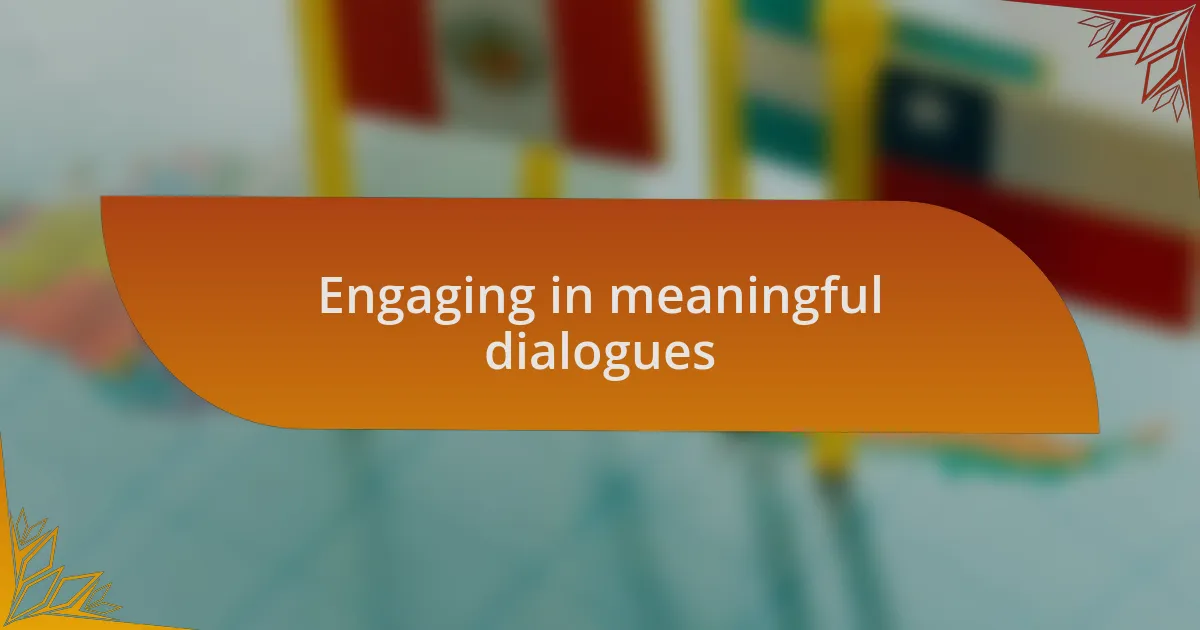
Engaging in meaningful dialogues
Engaging in meaningful dialogues about privilege requires us to step outside our comfort zones and actively listen to others. I recall a memorable dinner conversation with friends who come from different backgrounds. While discussing our experiences, I felt a mix of appreciation and discomfort as I listened to their stories of struggle; this moment highlighted just how vital it is to create spaces where everyone feels safe to share, learn, and grow.
I’ve also noticed that the quality of our dialogues often hinges on openness and empathy. During a community forum, one participant had a moment of vulnerability, openly sharing their feelings about feeling invisible in discussions of privilege. I found that when we allow ourselves to be vulnerable, sharing what we’ve learned and what we still don’t understand, we foster deeper connections and enrich the conversation. Isn’t it fascinating how a simple exchange of experiences can bridge the gap between different realities?
Embracing the idea that conversations about privilege can be transformative is crucial. I often reflect on the moments when I’ve had to confront my own biases, like when a colleague pointed out an oversight I had made in discussing race. That realization not only changed my perspective but also strengthened my resolve to seek out diverse voices. How can we expect to make meaningful progress if we don’t take the time to truly listen and engage with one another? This practice of authentic engagement is what I believe will ultimately guide us toward understanding and healing.
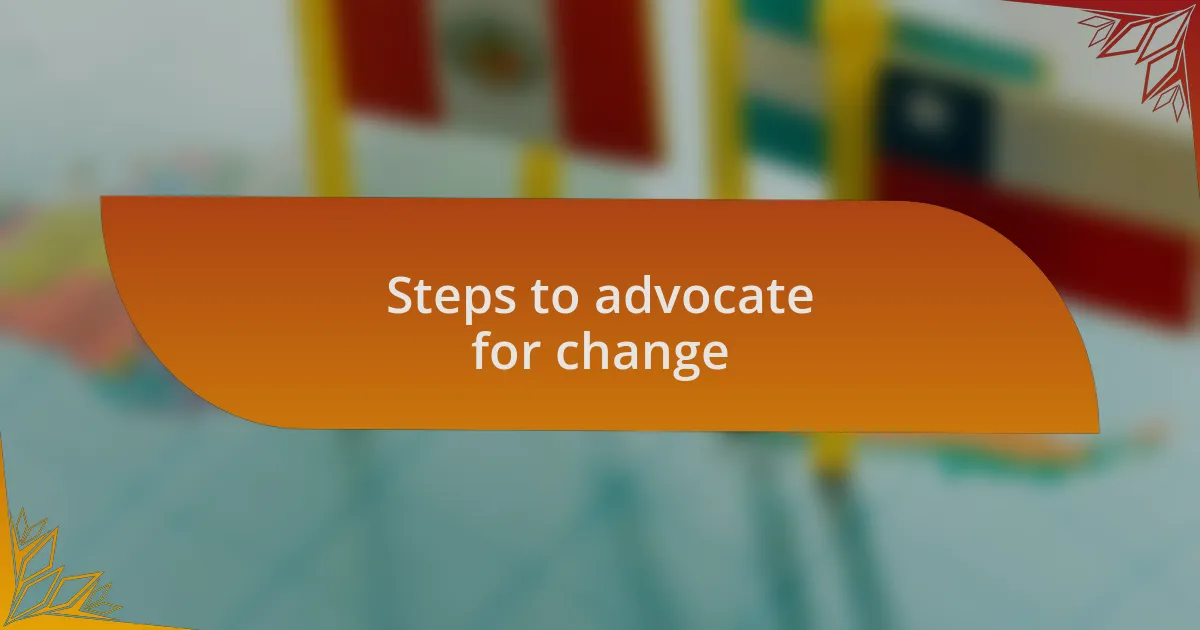
Steps to advocate for change
Advocating for change starts with education and awareness. I remember when I joined a workshop focused on systemic inequality—it was eye-opening for me. There were moments when I didn’t realize how my own experiences shaped my understanding of the world. What if we all took the time to educate ourselves about the histories and struggles surrounding privilege? It can be a powerful tool for igniting change.
Once we begin to grasp these complex issues, engaging in community action becomes vital. I participated in a local activism group where we organized dialogues in our neighborhood. The first meeting was intimidating; I was unsure of how my voice would be received. But as discussions unfolded, the sharing of stories became a catalyst for real change within our community—it’s true that collective action can amplify individual voices.
Advocating for change also involves speaking up in our daily lives, even when it feels uncomfortable. For instance, I recall a time at a social event where a harmful stereotype was perpetuated. I hesitated at first, but then I realized that remaining silent contributes to the problem. How often do we let moments like this pass? Speaking out not only holds others accountable but also fosters a culture of awareness and respect. Each step, no matter how small, is a crucial part of the movement toward equity.